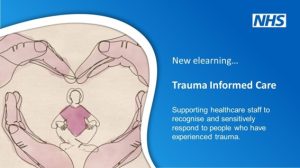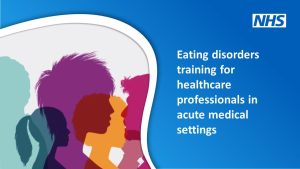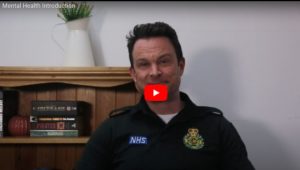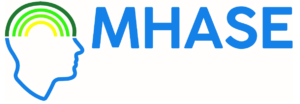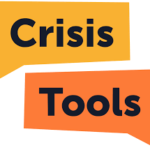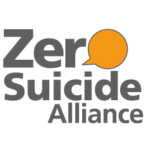NHSE – Eating Disorders Training for Health and Care Staff programme
About the Trauma-Informed Care programme
Recognising that NHS and social care staff are routinely exposed to trauma at work and experience moral injury, NHSE has worked in collaboration to design bespoke ‘trauma-informed care training’, ensuring these workforces become truly trauma- informed. Whilst we acknowledge that embedding trauma-informed care requires a systematic, multifaceted approach, the aim of this trauma-informed training is to support the learner in deepening their understanding on the importance of becoming more trauma sensitive in the way care is delivered, both as an individual and within a team or service.
The learning journey will be an ongoing and adaptive process which fosters a trauma-sensitive culture throughout all health and social care settings. The endpoint will be all staff understanding the impact of actual, potential and vicarious trauma on the lives of those who access services, and those who work within them, in order to reduce the potential for trauma to cause lasting harm and instead promoting post traumatic growth.
Trauma-informed care training – click here to access via ELFH
New session on acute medicine added to eating disorders programme
A new eLearning session has been developed to help healthcare professionals in acute medical roles to identify, assess and treat people with eating disorders.
The 60-minute resource includes information on providing medical assessment and treatment, admissions, transfer of care, appropriate treatment plans and the psychological impact of eating disorders on patients, their families and carers.
At the end of the session there are two videos demonstrating the assessment and management process in practice.
Eating Disorders in Acute Medical Settings has been developed by NHS England, Beat charity and the Royal College of Psychiatrists. Learners can access it within the Eating Disorders Training for Health and Care Staff programme.
About the eating disorders training for health and care staff programme
This series of training programmes was developed in response to the 2017 PHSO investigation into avoidable deaths from eating disorders as outlined in recommendations from the report titled Ignoring the Alarms: How NHS Eating Disorder Services Are Failing Patients (PHSO, 2017).
It is designed to ensure that healthcare staff are trained to understand, identify and respond appropriately when faced with a patient with a possible eating disorder.
It is the result of collaboration between eating disorder charity Beat, Health Education England and NHSE.
Dedicated to the memory of Averil Hart and everyone else who has died from an eating disorder, it is our hope that this will be a significant step to ensuring that avoidable deaths from eating disorders are consigned to the past.
ESR – MH induction training for ambulance staff
MHASE – Mental Health Ambulance Service Education
Responding to Suicide & its Impact
Young Black Men Mental Health Crisis Tools
We Can Talk –
Improve the experience of children & young people in mental health crisis
Overview – 000 Ambulance Mental Health Induction course
This is a new course launched on ESR for all staff new to the Ambulance Service in Operational or 111/999 roles.
It can also be used as awareness raising for all new staff and existing staff interested in developing their knowledge around mental health and mental well-being.
It’s an E-learning package of Mental Health Induction training for all Operational and Call centre staff new to the Ambulance service across England and Wales.
Duration
The Course is approximately 2.5 hours in length and has links to optional additional learning.
How to access
This course is designed as an introductory level course. It will include links to further CPD/Learning and is Phase one of a two phase project. Phase two will develop more detailed and specialist material for use as CPD, Research or to develop face to face training packages.
This course will help raise your awareness of how to respond to people experiencing a mental health crisis. It will help you understand how stigma and inequalities can impact on mental health. Understanding how anxiety affects the body and mind and learning how to manage your own anxiety are essential skills in any care setting. The course will give you a basic understanding of the most common forms of mental ill-health and to understand how those conditions impact on the people who experience them. The course teaches you the basics of the two most common legal frameworks in mental health work and will help develop your skills in communicating empathically and professionally with those experiencing a mental health crisis.
The repository is part of a Health Education England funded project to improve training ambulance staff to improve knowledge and skills in relation to supporting patients with mental health needs, in line with the aspirations of the NHS Long Term Plan (2019).
Click here to read the more about MHASE (leaflet)
The concept of a repository is a mechanism to store and make available for future use, any materials created by the project. This will include for example; conference presentations, E-learning packages, videos, case studies, personal reflective stories and statistical data. The repository will also collect existing materials and research from nationally and internationally recognised and reliable sources that can be used as part of CPD, research, to plan training sessions and for personal development. Materials will be available to all ambulance Trusts across England and the devolved nations. Upon completion of the project, editorial leadership will be provided by the Chair of the National Mental Health Ambulance Group. Anyone from an ambulance Trust will be able to send updated or new materials to the Chair to be uploaded into the Repository. By making quality materials and information available to staff in an accessible format, using a recognised provider like E-Learning for Health, we aim to improve staff knowledge and skills, improve patient care, and assist staff to support their own mental well-being.
To Access MHASE you will need an account on the NHS Learning Hub (this can also be accessed with an Open Athens log in)
Once on the page – you will see an expandable list of topics , each topic has a host of videos , resources and info (too much to list here – so here are the topic headings to give you an overview) –
- Conditions
- Legislation
- Treatment
- Staff Wellbeing
- Police
- LGBTQIA+
- BAME
- Lived Experience Vignettes and Personal Reflections
- Physical Health and Mental Health
- Older People’s Mental Health
- Children and Young People’s Mental Health
- MHASE Mental Health Film and Conference Materials
- Addiction and Mental Health
- Learning Disability and Mental Health
- Apps
- Miscellaneous
This is a rare opportunity to watch a discussion about emergency services personnel responding to suicide and its impact. Particular attention is be paid to their experiences, perceived needs and the importance of receiving evidence-based training dealing with this sensitive issue.
You can find out more about Suicide Bereavement UK at www.suicidebereavementuk.com and Speakers Collective at www.speakerscollective.org
If watching this causes you distress and you would like to talk to someone, you may find it helpful to get in touch with:
- Survivors of Bereavement by Suicide (SOBS): Helpline: 0300 11 5065 Monday to Friday 9am-9pm
- Samaritans: Helpline: 116 123 (24 hours) Email: jo@samaritans.org (24 hours)
- Cruse Bereavement Care: Helpline: 0808 808 1677 Monday to Friday 9.30am-5pm Tuesday, Wednesday & Thursday 9.30am-8pm Weekends 10am-2pm
This Conversation is recommended for those working in suicide prevention/postvention/emergency services.
Click Here to watch the recording if the video does not work.
In 2019, it was found that Young Black men are eight times more likely than their white counter parts to be given a community treatment order (CTO) after being treated in hospital under the Mental Health Act (NHS Digital, 2019). Furthermore, when engaging with young people to develop the core Crisis Tools (launched in August 2021), it was identified that staff needed a greater awareness on how best to support young Black men accessing mental health services.
HEE has worked with Healthy Teen Minds in partnership with 42nd Street, working with young people with lived experience, to launch an extension of Crisis Tools – Guides Supporting Young Black Men.
The 4 Crisis Tools Guides Supporting Young Black Men are:
2.What we need crisis services and practitioners to know
3.Understanding our perspective
4.Top tips from young Black men
The learning aims to help professionals identify young Black men’s needs during a mental health crisis. The guides focus on sharing young people’s experiences of barriers and discrimination and what can be most helpful in offering support during a mental health crisis.
See the document below for more information and resources.
We Can Talk is using co-production to improve the experience of children and young people who attend hospital due to their mental health and the staff who support them.
Join We Can Talk online for free!
Register here
Benefits include:
Free- training co-produced by young people, hospital staff and mental health professionals.
One-hour We Can Talk fundamentals of compassionate care training session introducing key approaches to supporting young people in mental health crisis.
Core Curriculum, a one-day (six hour) training programme that gives hospital staff the core skills, knowledge and confidence to improve the experience of children and young people presenting to hospital due to their mental health. The training is in modules – so you can pick it up and put it down and not have to sit at the computer for 6 hours. Unless of course you want to. Available for all staff in partner organisations
Access to live events, webinars, resources and competitions.
Save your favourite resources and training material for quick access when you need it most.
Certificates for your professional development record for completing training and attending events.
Future Learn Psychological first aid
MCTI – Team Dynamics & Human Factors
Zero Suicide
Alliance
Alison Platform – First Aid for Mental Health
COVID-19: Psychological First Aid – Free course
Learn how to give practical and emotional support to individuals using PFA
Psychological First Aid (PFA) is the globally recommended training for supporting people during emergencies and offers guidance on delivering psychosocial care in the immediate aftermath of the emergency event.
On this course, you’ll explore the psychological impact of the COVID-19 pandemic and what you can do to help people cope. As well as this, the course will teach you the key principles of giving psychological first aid in emergencies.
This course has been produced by Public Health England and is based on international guidance from the World Health Organisation, United Nations and partners.
Click here for more info & to sign up for this free online course
The Mission Critical Team Initiative was created to support those teams by inviting them into a Collaborative Inquiry Community to share effective practices, validate applied research, and innovate in the area of learning, instruction, and professional development.
About Mission Critical Team Institute
We have come across this organisation that may prove interesting to educators, practice educators, operational staff and commanders. This organisation work with ‘Mission Critical Teams’ across the world.
A MCT is loosely defined as – indigenously trained small teams of 4 -12 people who operate in immersive environments dealing with rapidly evolving complex and /or chaotic problems that need to be dealt with in under 5 mins, where failure yields results that are fatal or catastrophic.
They work with a range of teams, from military Special Forces, Emergency Medicine, Law Enforcement, Fire & Rescue, and elite athletes and sports people. Their work has produced some interesting research which is publicly available below, and some of the podcasts carry some very transferable ideas.
Their goal, in partnering with both researchers and practitioners, is to develop collaborative applied research focused on helping Mission Critical Teams effectively detect, recognise, react, respond, and recover from the radical change events caused by rapidly emergent complex adaptive problem sets.
Public resources you may find interesting – (more on the website here – but we haven’t read them yet! They are easy to read papers, not so much in the style of formal medical research papers you may be used to)
Residue and Choosing the Hard Path (click here for PDF download), Dr. Preston Cline – This paper brings a different look at immersive experiences and PTSD
After Action Reviews: AARs (click here for PDF download), Coleman Ruiz – This paper talks about de-briefs
Learning to Navigate Uncertainty (click here), Dr. Preston Cline – This paper discusses learning and problem solving
The Zero Suicide Alliance is a collaborative of National Health Service trusts, businesses and individuals who are all committed to suicide prevention in the UK and beyond.
The alliance is ultimately concerned with improving support for people contemplating suicide by raising awareness of and promoting FREE suicide prevention training which is accessible to all.
The aims of this training are to: enable people to identify when someone is presenting with suicidal thoughts/behaviour, to be able to speak out in a supportive manner, and to empower them to signpost the individual to the correct services or support.
Access their WEBSITE HERE including FREE Suicide prevention e-learning and free resources.
This free online course will study the characteristics of good mental health and early signs of mental health problems. An overview of the roles of mental health first aiders will also be covered, as well as the advantages they bring to the workforce.
Mental health is about psychology, emotions and social health. It encompasses our approach to stress and influences how we relate to the people around us and how we make decisions. Mental health problems are common and affect one out of five young people. Nevertheless, many people do not know how to provide support and use the best treatments and services that are available.
First aid for mental health, popularly referred to as ‘mental health first aid’, adopts an approach that helps people seek professional assistance, offer reassurance and support and detect the signs of mental illness.
Throughout this free* 5-6 hour course, you will study the following modules:
- Mental Health Management – Learning Outcomes
- Mental Health Issues and Mental Well-Being
- Understanding Mental Disorders
- Mental Health Solutions and Therapies
- Mental Health Management – Lesson Summary

